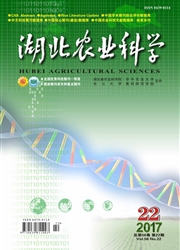

 中文摘要:
中文摘要:
以药用植物甘草为材料,采用沙基培养法培养幼苗,以含有不同浓度的NaCl或Na2CO3的营养液对其分别进行不同强度的盐胁迫和碱胁迫处理。结果表明,甘草幼苗在NaCl浓度不超过350 mmol·L-1、Na2CO3浓度不超过50 mmol·L-1条件下可全部存活,在NaCl浓度不超过150 mmol·L-1时对甘草生长无明显影响;NaCl浓度超过150 mmol·L-1、Na2CO3浓度超过50 mmol·L-1,甘草生长明显受到抑制,日相对生长率、单叶面积及根系活力均呈下降趋势,膜伤害加剧,膜透性增大,丙二醛含量升高。在相同浓度胁迫下,碱胁迫的胁变反应均比盐胁迫强烈,说明甘草的抗盐性高于抗碱性,低浓度盐对甘草的生长起促进作用。
 英文摘要:
英文摘要:
Medicinal plant Glycyrrhiza uralensis Fisch was taken as the material. Seedlings of sand-cultured were stressed with different concentration of NaCl and Na2CO3. The results showed that the strain responses were as follows: the seedlings were able to survive when the concentration of NaC1 was no higher than 350 mmol·L-1 and Na2CO3 was no higher than 50mmol·L-1. It grew well when the concentration of NaCl was below 150 mmol·L-1. With the concentration of NaC1 being above 150 mmol·L-1 and Na2CO3 being above 50mmol·L-1, the growth was obviously inhibited, at same time relative growth rate, leaves area and root vitality decreased. Membranes were undermined further. The content of MDA increased. Under the stress of the same concentration of Na~, the stress reaction of alkali stress was more seriously than that of the saline stress. The experiments demonstrated that the resistance of Glycyrrhiza uralensis Fisch to saline stress was clearly higher than to alkali stress, the lower concentration of salt promoted the growth.
 同期刊论文项目
同期刊论文项目
 同项目期刊论文
同项目期刊论文
 The Key Physiological Response to Alkali Stress by the Alkali-Resistant Halophyte Puccinellia tenuif
The Key Physiological Response to Alkali Stress by the Alkali-Resistant Halophyte Puccinellia tenuif Effects of various salt-alkaline mixed stresses on the state of mineral elements in nutrient solutio
Effects of various salt-alkaline mixed stresses on the state of mineral elements in nutrient solutio Comparative effects of salt-stress and alkali-stress on the growth, photosynthesis, solute accumulat
Comparative effects of salt-stress and alkali-stress on the growth, photosynthesis, solute accumulat Comparative effects of salt and alkali stresses on organic acid accumulation and ionic balance of se
Comparative effects of salt and alkali stresses on organic acid accumulation and ionic balance of se Comparison of the effects of salt-stress and alkali-stress on photosynthesis and energy storage of a
Comparison of the effects of salt-stress and alkali-stress on photosynthesis and energy storage of a 期刊信息
期刊信息
